ENTER SANDMAN
With Audible’s Sandman adaptation due out in July, Ian Winterton spoke to radio drama pioneer Dirk Maggs about his 30 year quest to turn Neil Gaiman’s ground-breaking comic book into an “audio movie”.
“I will show you terror in a handful of dust.”
These words, featured in print adverts in 1988, introduced the worl d to a new comic book series from DC’s Vertigo imprint: The Sandman. Written by a then largely unknown Neil Gaiman, it told the tale of Dream, known to many as Morpheus, one of the seven Endless. A dizzyingly brilliant blend of mythology, history and fantasy, it quickly transitioned from cult hit to mainstream success and Gaiman, along with Alan Moore and Frank Miller, became part of the late-80s graphic novel renaissance.
Unlike countless other comic book creations, Sandman was never adapted into other mediums – until now. But it’s not a film, or a TV series or a video game, but an audio drama, with no less a legend than Dirk Maggs at the helm. A pioneer in
the field these past 30 years, his innovative and varied body of work includes radio versions of Batman, Spider-Man, Superman and Judge Dredd.
“I discovered early on,” he says, “in the late 80s, early 90s, that I had a knack for taking comic book material and editing and massaging it in such a way as to make driving, exciting audio which sounded just like a film but had no pictures – which were created in the listener’s brain. We expanded into Dolby Surround, we introduced especially composed scores – it was all happening.”
Of all the superheroes getting what Maggs describes as his “audio movie”, there was one above all others that he was desperate to adapt: Sandman.
“DC at that time were based in New York City,” Maggs recounts, “and I hit it off especially well with their Business Affairs Manager, Phyllis Hume, a feisty no-nonsense Brooklynite who had a wonderfully dry sense of humour and didn’t waste praise where it wasn’t earned. She told me to read this ‘amazing’ new series coming out on DC/Vertigo. I read the first issue and was blown away. It was a monumental work of literature written for a 22 page comic book –punchy, direct, uncluttered by stereotypes, and exactly the sort of material I knew I could turn in amazing audio.”
He pitched it to the BBC and… they passed.
“It was frustrating,” he sighs, “but Neil wasn’t the figure he is nowadays and they were wary about having too much comic book entertainment – wary of ‘dumbing down’, perhaps. It made no sense to me because it was ready made for the audience the BBC networks – particularly Radio 4 – supposedly wanted to attract: anyone under 50, basically. I pitched it several times over the years, but they just couldn’t see it, not even when Neil became a respected and applauded novelist and screenwriter.”
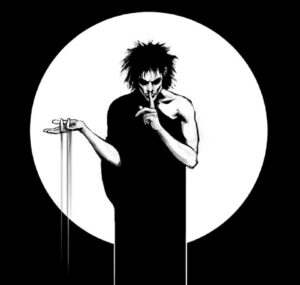
Disappointing though this was, Dirk’s correspondence with Gaiman turned into a friendship – and they discovered that they had both been close to Douglas Adams, the author of The Hitchhiker’s Guide to the Galaxy who died aged just 49 in 2001.
“Neil was mentored early on by Douglas,” says Maggs, “while he changed my life when he chose me to adapt his later Hitchhiker novels for radio.”
While Sandman remained elusive, Maggs’ friendship with Gaiman bore other audio fruit as the years 2013-2017 saw BBC radio commissioning audio movies of Gaiman’s Neverwhere, Stardust, Anansi Boys and, co-written with Terry Pratchett, Good Omens.
This flurry of activity coincided with one of the stranger consequences of our internet age: the return of audio drama. Though it had never gone away for UK citizens, thanks largely to BBC Radio 4, audiences across the globe rediscovered this lost artform. And were willing to pay for new content.
Enter Amazon’s audiobook arm, Audible, brandishing chequebook. Maggs, with his reputation for turning properties with cult cache into unmissable radio, was tasked with adapting Alien spin-off novels. The results were astounding and, as many reviewers noted, far superior to the dreary prequels being churned out by Ridley Scott at the same time.
Then it happened – DC contacted Maggs and Audible: would they like to adapt Sandman?
“I many ways it’s perfect that we’ve had to wait,” is Maggs’ philosophical take. “Neil says he’s glad, too, because we’re better at what we do. The Sandman is like a good wine – it grows richer and more complex the older you leave it, and I don’t think I could have brought out half of its quiet complexities 25 years ago.”
And there’s the added bonus of Amazon-Audible’s deep pockets, which enabled Maggs to assemble a huge cast, including many “very famous” actors – none of whom Maggs can yet reveal.
“Strictly embargoed, I’m afraid,” he says. “But all I’ll say is it’s strange we didn’t record in Los Angeles considering the Hollywood talent we secured.”
Of Dream, himself, Maggs won’t be drawn, except to say that the actor in question was his first and only choice.
“Oh heck, what can I say? He was always there. He has exactly what Dream needs to come to life … and he is amazing.”
Recording was divided between London, New York and Atlanta, Georgia – the location of The Walking Dead’s production base. If there’s a conclusion to be drawn from that, Maggs is keeping his lips firmly zipped. Either way, it’s “by far the biggest cast” Maggs has ever had on a single project.
“I make it 70, on a quick head count. All are brilliant, there really are no exceptions. Everybody brought their ‘A’ game. In the ensemble sessions last October we had up to 15 people at any one time in a studio built for a third of that number. But everybody was so into the material, and the characters and stories themselves are so gripping that where possible I ran the whole story in one go, recorded voices-only to the mics. It was absolutely enthralling to hear it performed like that. And it wasn’t just the stars who made it sing – the whole ensemble absolutely soared into the realms of Dream. Listening to it now, in post-production where I’m currently labouring, it’s all sounding amazing.”
One cast member who has been announced is Neil Gaiman himself, on board as the narrator. To create the narration, Maggs made the inspired choice to draw, not only on the words printed in the comic books, but Gaiman’s actual scripts.
“It is one of the most exciting things about this project,” Maggs enthuses. “The scripts are a window into what is going on in Neil’s mind, as he is writing the stories. And they are poetry. There’s a scansion to his writing, a rhythm that can be gentle or formal, from blank verse to iambic pentameter – and of course Will Shakespeare does feature in two of the stories in this first series. Part of the joy of the process was to hear our actors – some senior Shakespearian ones too – breathing life into these lines, lifting them off the page, giving them that rhythm. There were times in studio where shivers ran up my back as dialogue I had only ever read off the page burst into vibrant, living existence.”
Maggs even incorporated a passage from Gaiman’s private papers.
“It’s never been heard, or read by anyone but Neil,” Maggs explains. “He wrote some background on the creation of Dream’s talisman, his Ruby, and I placed it during the confrontation with Doctor John Dee, because it’s the subject of the story and it is beautiful and riveting.”
The whole experience has been a “privilege” says Maggs. And not, it would seem, just for him. Gaiman himself has quietly expressed a joy at revisiting stories he wrote 30 years ago, though he doesn’t recognise the person he wrote them as himself. Maggs says:
“At the end of a particularly good mixing day a short while ago I emailed Neil and said, ‘This stuff just comes alive – damn, you’re good.’ He came back saying he’s not sure he recognises the person who wrote it because it was so long ago. I assured him that whoever that person was, they had created magic – and it translates beautifully into our strangely visual realm of pure audio.”
A slightly shorter version of this feature appeared in SciFiNow in April 2020.

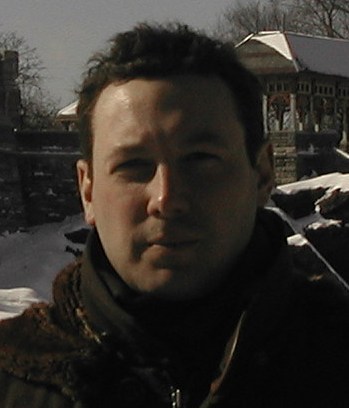
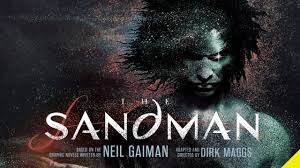
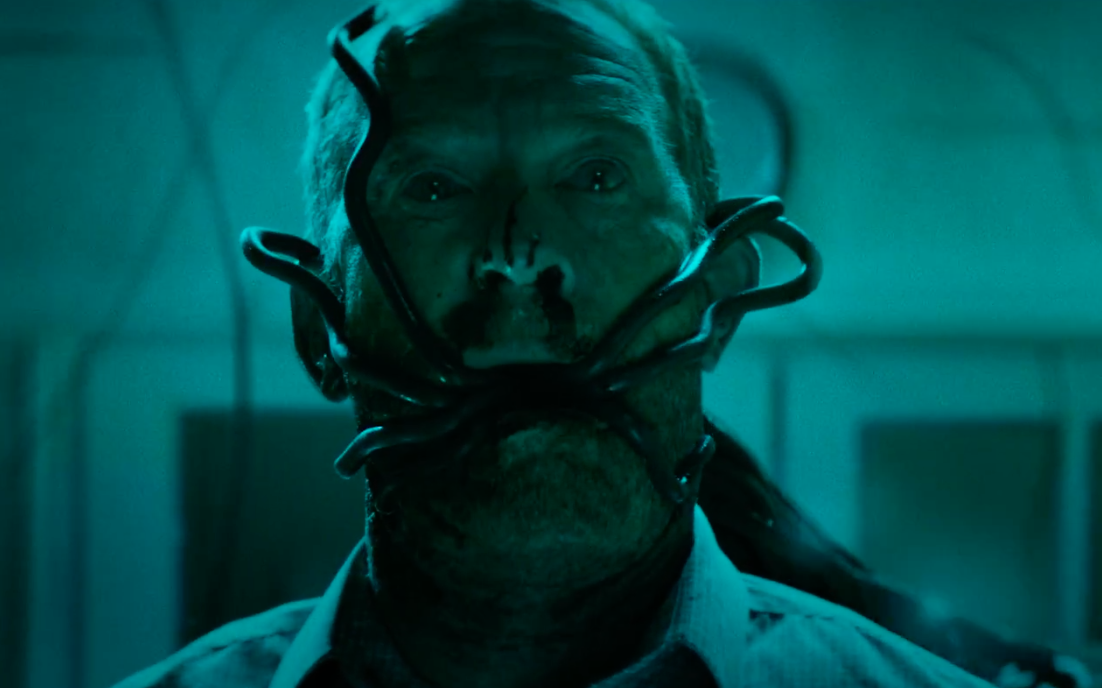
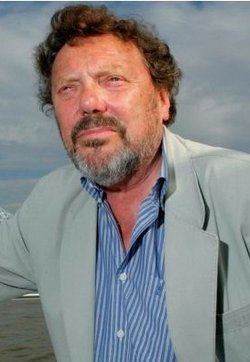
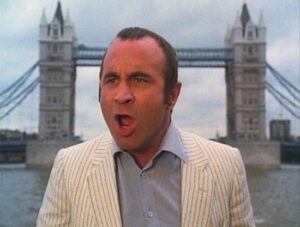 A pleasure cruiser chugs up the Thames in the mellow sunlight of a beautiful summer evening. On board, a handful of journalists sip champagne on deck, watching London slide past – the Eye, the Town Hall, swanky apartment blocks and, up ahead, that little slice of Downtown Manhattan, Canary Wharf.
A pleasure cruiser chugs up the Thames in the mellow sunlight of a beautiful summer evening. On board, a handful of journalists sip champagne on deck, watching London slide past – the Eye, the Town Hall, swanky apartment blocks and, up ahead, that little slice of Downtown Manhattan, Canary Wharf.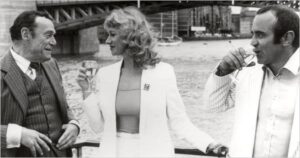 In a word, it was a shit-hole. Mackenzie knows better than most how radically Docklands has changed. Not only was the site utilised for its grimy locations, but it was integral to the plot. The film’s antihero, Harold Shand (Bob Hoskins), is a gangster desperate to turn legit who sees the undeveloped wasteground as the key to his salvation. Twenty-five years on, it adds an air of prophecy to an already outstanding film.
In a word, it was a shit-hole. Mackenzie knows better than most how radically Docklands has changed. Not only was the site utilised for its grimy locations, but it was integral to the plot. The film’s antihero, Harold Shand (Bob Hoskins), is a gangster desperate to turn legit who sees the undeveloped wasteground as the key to his salvation. Twenty-five years on, it adds an air of prophecy to an already outstanding film.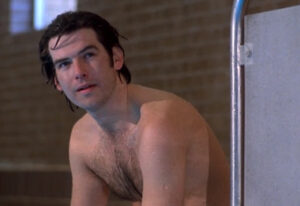 We’re below decks now, in a dining area that, alarmingly, recalls the room in the film where Hoskins brutally thrusts a wine glass into the neck of Derek Thompson, who later found fame as Charlie in Casualty. He’s just one of many ‘faces-of-the-future’ that further bolster the film’s visionary credentials. There’s Dexter Fletcher, Helen Mirren, Eastenders’ Gillian Taylforth and, as a homoerotic hitman, Pierce Brosnan. Mackenzie humbly attributes this talent spotting to “great casting director”, Simone Reynolds.
We’re below decks now, in a dining area that, alarmingly, recalls the room in the film where Hoskins brutally thrusts a wine glass into the neck of Derek Thompson, who later found fame as Charlie in Casualty. He’s just one of many ‘faces-of-the-future’ that further bolster the film’s visionary credentials. There’s Dexter Fletcher, Helen Mirren, Eastenders’ Gillian Taylforth and, as a homoerotic hitman, Pierce Brosnan. Mackenzie humbly attributes this talent spotting to “great casting director”, Simone Reynolds.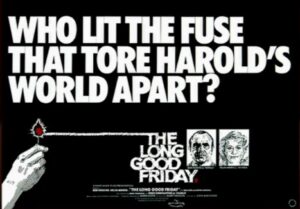 “I was so incensed when I heard about this that I went crazy in a corner of Soho,” laughs Mackenzie. “But, as it turned out, that was our ace card because they’d just gone too far. Bob was going to sue them and he got all sorts of high-profile actors like Alec Guinness willing to stand up in court. They got scared and so, when George Harrison and his Handmade company got involved, we were able to buy it pretty cheaply.”
“I was so incensed when I heard about this that I went crazy in a corner of Soho,” laughs Mackenzie. “But, as it turned out, that was our ace card because they’d just gone too far. Bob was going to sue them and he got all sorts of high-profile actors like Alec Guinness willing to stand up in court. They got scared and so, when George Harrison and his Handmade company got involved, we were able to buy it pretty cheaply.”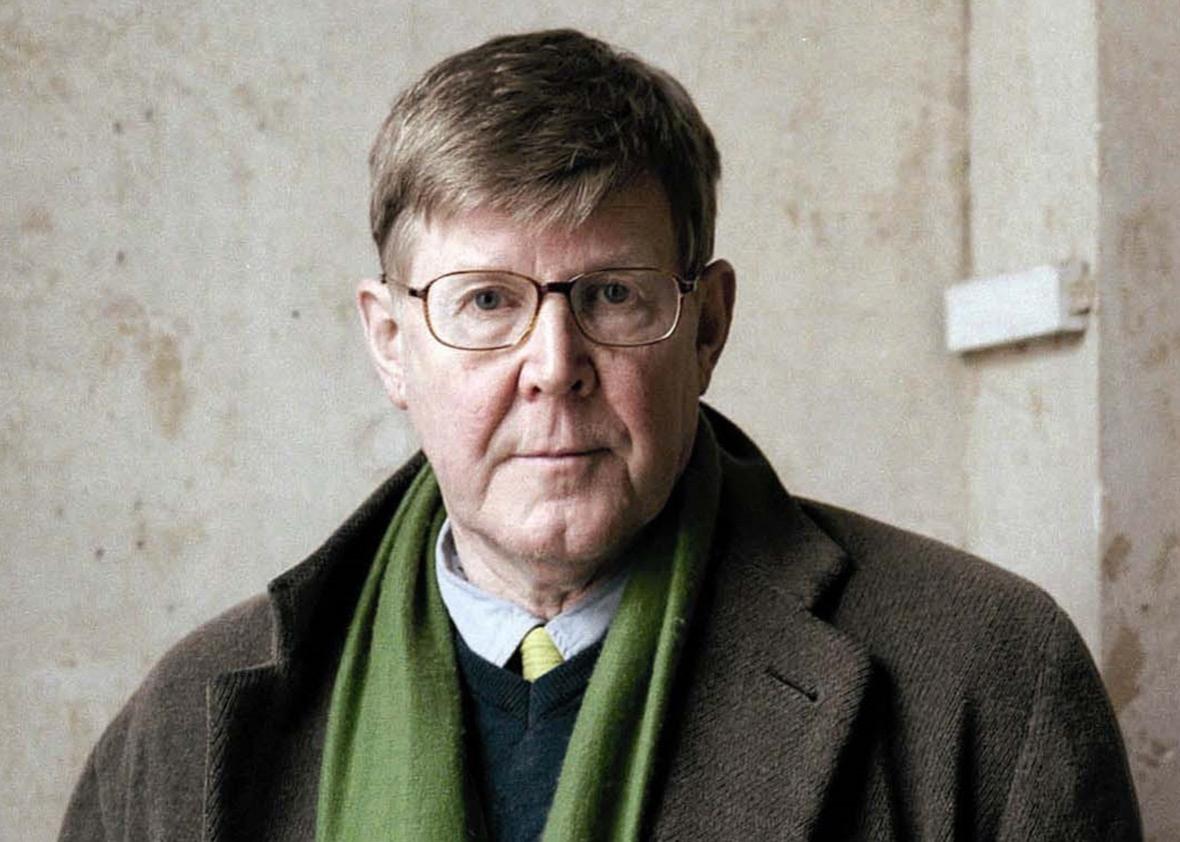
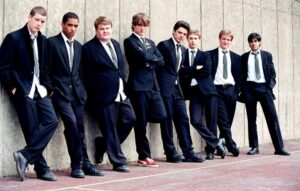
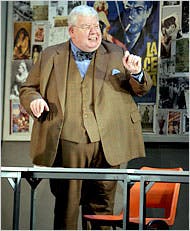
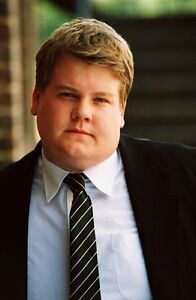

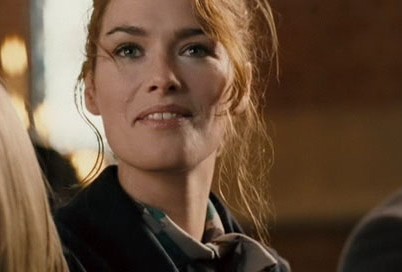
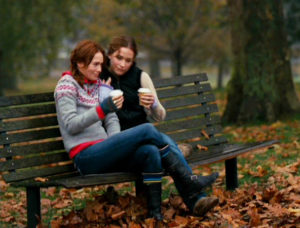 Set far away from Huddersfield, in London’s leafy Primrose Hill, Imagine Me & You is the sort of romantic comedy that, ever since Four Weddings, Americans lap up. While it won’t play as well over here, writer-director Ol Parker does at least have fun with the genre’s clichés. Not least because, for once, the requisite unrequited love is between two women. Heady plays Luce, a lesbian florist, who falls for Rachel, played by the beautiful Piper Perabo.
Set far away from Huddersfield, in London’s leafy Primrose Hill, Imagine Me & You is the sort of romantic comedy that, ever since Four Weddings, Americans lap up. While it won’t play as well over here, writer-director Ol Parker does at least have fun with the genre’s clichés. Not least because, for once, the requisite unrequited love is between two women. Heady plays Luce, a lesbian florist, who falls for Rachel, played by the beautiful Piper Perabo.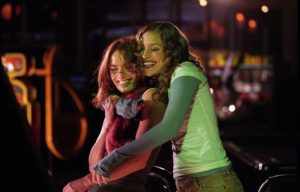 “We’d just shot The Cave together in Romania,” says Heady, “and then both got to play Luce and Rachel together. That was good for bonding – if you spend any amount of time with anyone in Romania you’ll bond. It’s pretty harsh out there. I was a vegetarian, but I’m not anymore.”
“We’d just shot The Cave together in Romania,” says Heady, “and then both got to play Luce and Rachel together. That was good for bonding – if you spend any amount of time with anyone in Romania you’ll bond. It’s pretty harsh out there. I was a vegetarian, but I’m not anymore.”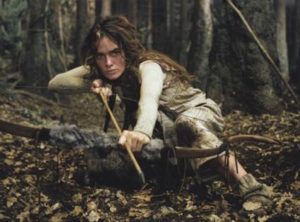
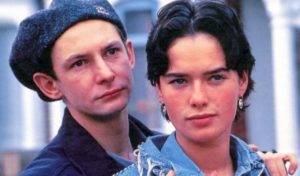
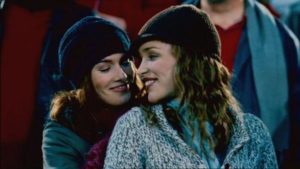 “Oh yeah. I mean, in Imagine Me & You, I get to stand on top of a car, in a full traffic jam, and shout ‘I love you!’ in front of loads of people. There’s something lovely about getting to do something you’d never do in real life.”
“Oh yeah. I mean, in Imagine Me & You, I get to stand on top of a car, in a full traffic jam, and shout ‘I love you!’ in front of loads of people. There’s something lovely about getting to do something you’d never do in real life.”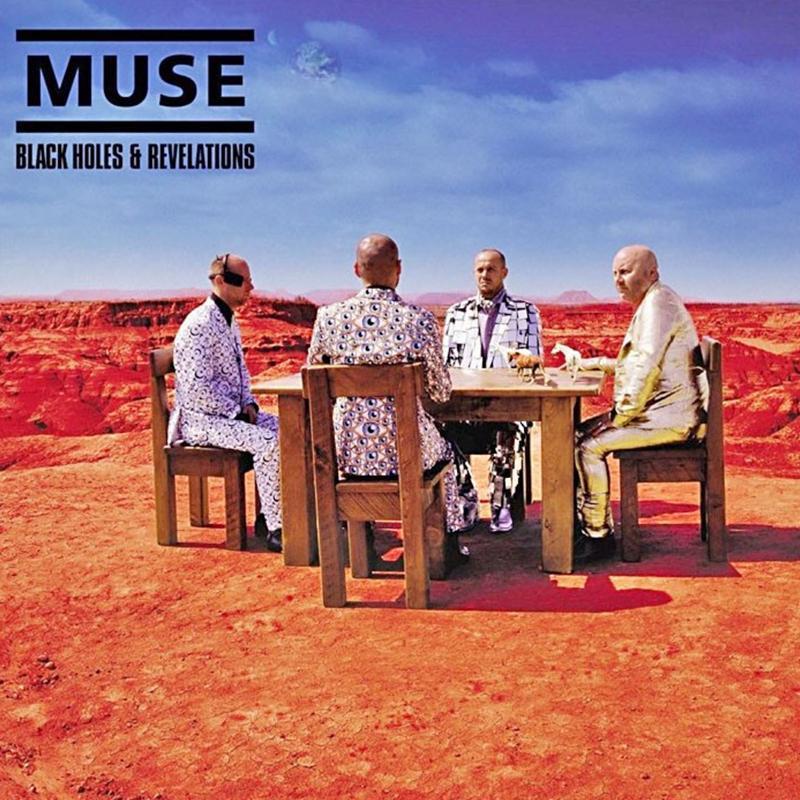
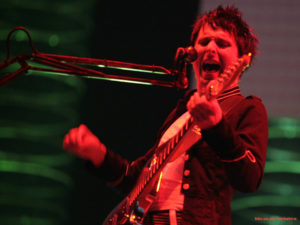 “Yeah, we’ve got Morricone and flamenco going on,” Bellamy allows. “We recorded some sections in Northern Italy, which is why I think we took on that south European sound. I’ve always loved that stuff but never found a way of getting it into the songs. I tried a bit on the second album with Screenager but it came out a bit crap.”
“Yeah, we’ve got Morricone and flamenco going on,” Bellamy allows. “We recorded some sections in Northern Italy, which is why I think we took on that south European sound. I’ve always loved that stuff but never found a way of getting it into the songs. I tried a bit on the second album with Screenager but it came out a bit crap.”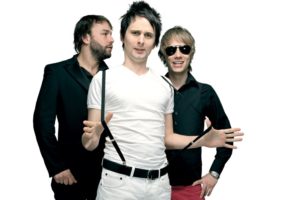 Which brings us to Bellamy’s much publicised love of conspiracy theories and other wacky notions. Interviewed in the Guardian, he admitted that he found a lot of David Icke’s ideas compelling. Maybe he is mad after all. Are the giant lizards of the Babylonian Brotherhood running the planet?
Which brings us to Bellamy’s much publicised love of conspiracy theories and other wacky notions. Interviewed in the Guardian, he admitted that he found a lot of David Icke’s ideas compelling. Maybe he is mad after all. Are the giant lizards of the Babylonian Brotherhood running the planet?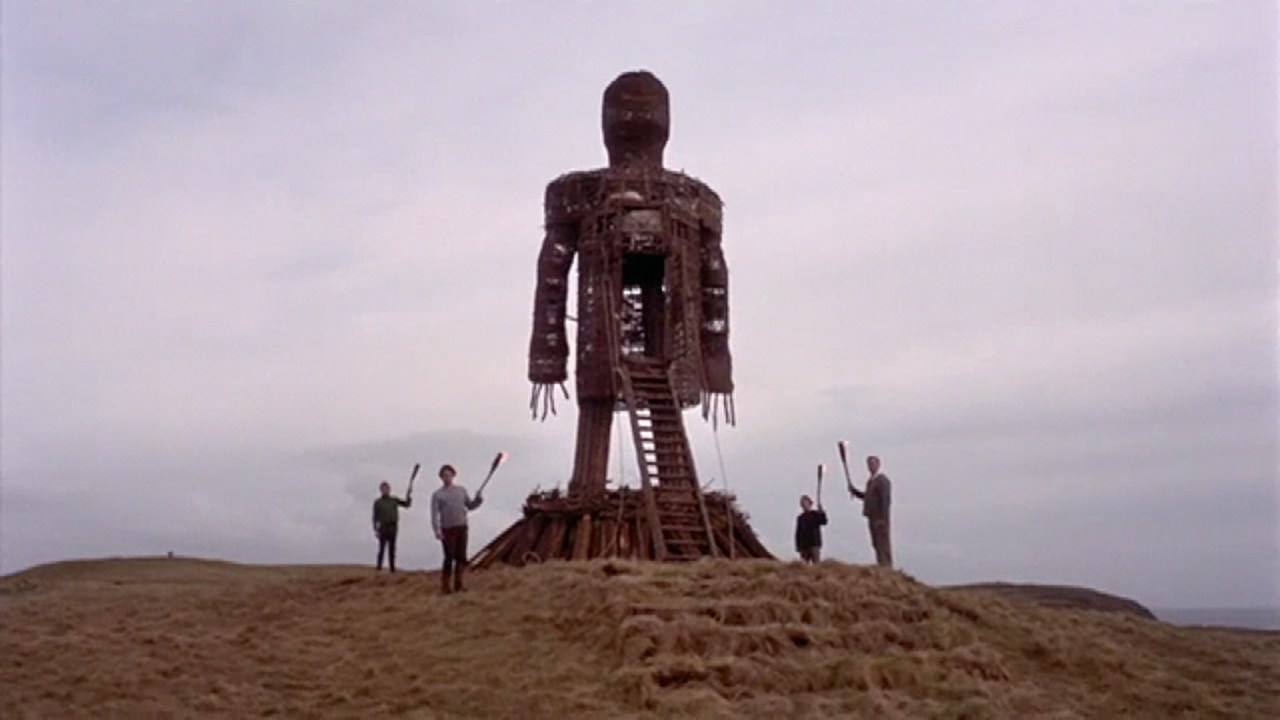
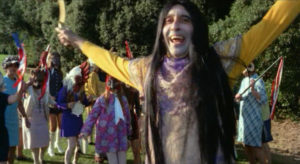 Hardy’s disappointment at losing Lee – whose charismatic but, frankly, bonkers Lord Summerisle is the perfect counterpoint to Woodward’s dour copper – remains palpable. It’s fair to say Lee has a reputation for being a bit of a diva. This reporter was once told, by Robert ‘Freddy Kruger’ Englund no less, that Lee “feels most genre films” – i.e. all The Hammer horrors that made his name – “are beneath an actor of his talents”.
Hardy’s disappointment at losing Lee – whose charismatic but, frankly, bonkers Lord Summerisle is the perfect counterpoint to Woodward’s dour copper – remains palpable. It’s fair to say Lee has a reputation for being a bit of a diva. This reporter was once told, by Robert ‘Freddy Kruger’ Englund no less, that Lee “feels most genre films” – i.e. all The Hammer horrors that made his name – “are beneath an actor of his talents”.
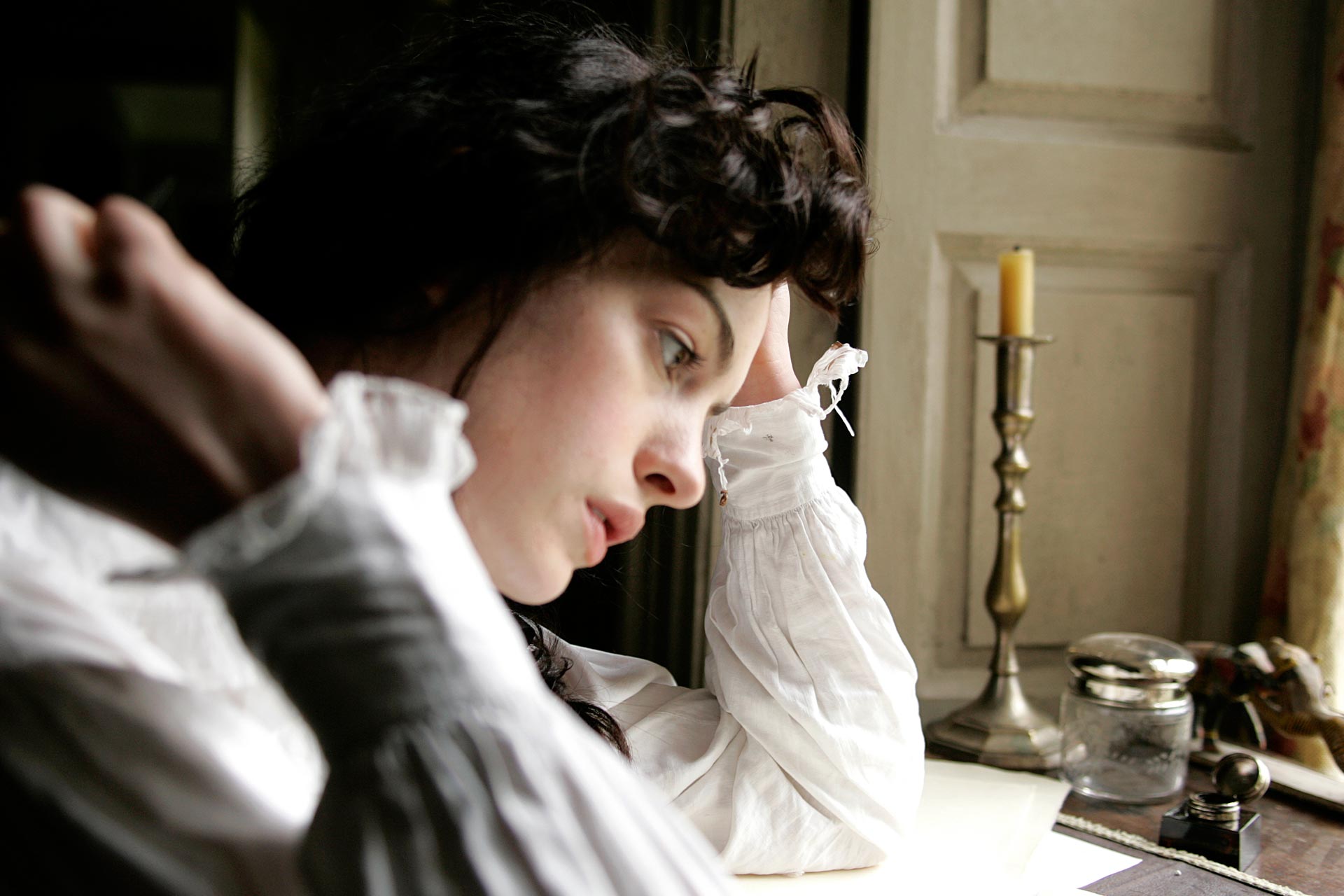
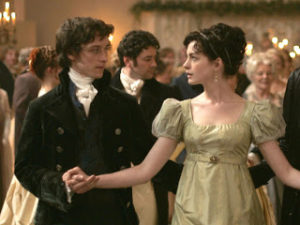 As Luveen, the brassy Texan gal who finds herself married to Jake Gyllenhaal’s gay cowboy, Hathaway was a revelation; those critics who’d dismissed her as fit only for soporific live-action Disney movies were forced to eat their words. Hollywood, though, had long been aware of her potential, with Princess Diaries director Garry Marshall describing Hathaway in Variety magazine as, “multi-talented… a combination Julia Roberts, Audrey Hepburn and Judy Garland.”
As Luveen, the brassy Texan gal who finds herself married to Jake Gyllenhaal’s gay cowboy, Hathaway was a revelation; those critics who’d dismissed her as fit only for soporific live-action Disney movies were forced to eat their words. Hollywood, though, had long been aware of her potential, with Princess Diaries director Garry Marshall describing Hathaway in Variety magazine as, “multi-talented… a combination Julia Roberts, Audrey Hepburn and Judy Garland.” “It was really changeable,” recalls Hathaway. “We didn’t know if it was the Gods or Jane being upset that I was playing her but every single time I had to do a close-up, it would rain. And it was cold! The accent took a lot of work but when you’ve been in a field for five hours waiting for the rain to stop and just standing there freezing… I just sound drunk in a lot of scenes.”
“It was really changeable,” recalls Hathaway. “We didn’t know if it was the Gods or Jane being upset that I was playing her but every single time I had to do a close-up, it would rain. And it was cold! The accent took a lot of work but when you’ve been in a field for five hours waiting for the rain to stop and just standing there freezing… I just sound drunk in a lot of scenes.”
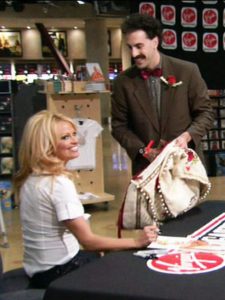 “Jagshemash!” he booms from behind a podium, in front of which stand auto-cue screens; so much for Baron Cohen the master improviser. Much of his resolutely un-PC material has been heard before at other press conferences available online, as have some of his put-downs to members of the press asking questions.
“Jagshemash!” he booms from behind a podium, in front of which stand auto-cue screens; so much for Baron Cohen the master improviser. Much of his resolutely un-PC material has been heard before at other press conferences available online, as have some of his put-downs to members of the press asking questions.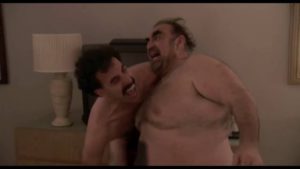 As it was, the production’s guerrilla-style filmmaking involved the cops on numerous occasions. A warrant was issued for Baron Cohen’s arrest in New York, after he – as Borat – ran naked through a hotel waving a rubber fist-shaped dildo. While he narrowly avoided incarceration, producer Monica Levinson and production manager Dale Stern didn’t fare so well, thrown in a cell by the NYPD for ‘borrowing’ a phone, alarm clock and comforter from a local hotel to use as props. Even though the filmmakers had a location agreement and a $5 million insurance policy, the police went ahead with the arrests. To protect his colleagues, Stern ate a sheet listing the names and phone numbers of the film’s crew.
As it was, the production’s guerrilla-style filmmaking involved the cops on numerous occasions. A warrant was issued for Baron Cohen’s arrest in New York, after he – as Borat – ran naked through a hotel waving a rubber fist-shaped dildo. While he narrowly avoided incarceration, producer Monica Levinson and production manager Dale Stern didn’t fare so well, thrown in a cell by the NYPD for ‘borrowing’ a phone, alarm clock and comforter from a local hotel to use as props. Even though the filmmakers had a location agreement and a $5 million insurance policy, the police went ahead with the arrests. To protect his colleagues, Stern ate a sheet listing the names and phone numbers of the film’s crew.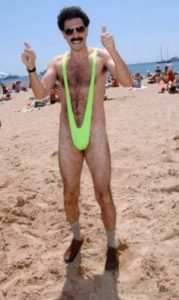 Baron Cohen no doubt has similar stories, especially as he reportedly r#main#d as Borat even when being beaten to the ground by security guards. But his insistence on staying in character and refusal to appear before the press as himself, while no doubt th# k#y to his fantastic performance, is intensely frustrating. Back in the Dorchester, the final question comes from a man who tells Borat that he’s from Israel.
Baron Cohen no doubt has similar stories, especially as he reportedly r#main#d as Borat even when being beaten to the ground by security guards. But his insistence on staying in character and refusal to appear before the press as himself, while no doubt th# k#y to his fantastic performance, is intensely frustrating. Back in the Dorchester, the final question comes from a man who tells Borat that he’s from Israel.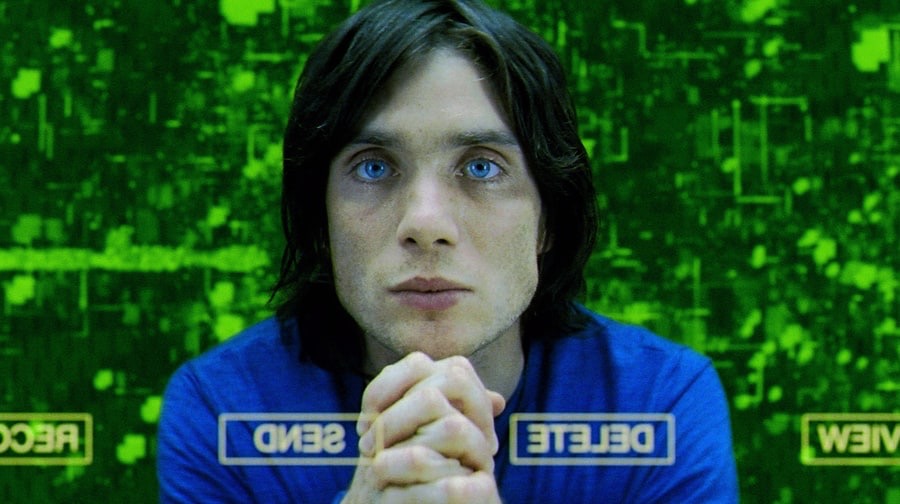
 By the very nature of their profession, actors are paid to pretend, but it’s not often – on film at least – that they have to make believe they’re looking at the Sun without it actually being there. But, when he says, “The Sun was all put in afterwards in post-production”, Irish-born Cillian Murphy isn’t joking.
By the very nature of their profession, actors are paid to pretend, but it’s not often – on film at least – that they have to make believe they’re looking at the Sun without it actually being there. But, when he says, “The Sun was all put in afterwards in post-production”, Irish-born Cillian Murphy isn’t joking.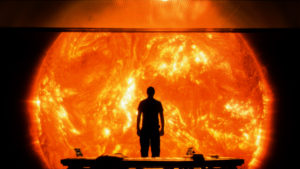 “It wasn’t supposed to be luxurious and it wasn’t,” chuckles Murphy. “A lot of the time as actors you come in on a Monday morning and the director says, ‘Right, you’ve known each other for ten years.’ And you can do it, you can do the job. There’s that classic scene in Alien where they’re around the table and they get an amazing sense of familiarity. You really believe that they’ve been travelling together in space for however long. We wanted to get that sense as well so the best way to do that, other than actually acting it is to live together and then let the experience inform the performance. We all lived together and ate and cooked and drank together.”
“It wasn’t supposed to be luxurious and it wasn’t,” chuckles Murphy. “A lot of the time as actors you come in on a Monday morning and the director says, ‘Right, you’ve known each other for ten years.’ And you can do it, you can do the job. There’s that classic scene in Alien where they’re around the table and they get an amazing sense of familiarity. You really believe that they’ve been travelling together in space for however long. We wanted to get that sense as well so the best way to do that, other than actually acting it is to live together and then let the experience inform the performance. We all lived together and ate and cooked and drank together.”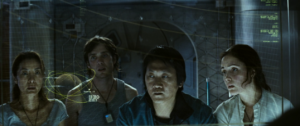 As well as recreating what sounds like a Thespian version of The Young Ones, the actors were all sent on an “astronaut bootcamp” which saw them attend lectures, go scuba diving (the nearest we can get to space-walking on Earth) and a trip in a light aircraft to stimulate zero-G.
As well as recreating what sounds like a Thespian version of The Young Ones, the actors were all sent on an “astronaut bootcamp” which saw them attend lectures, go scuba diving (the nearest we can get to space-walking on Earth) and a trip in a light aircraft to stimulate zero-G.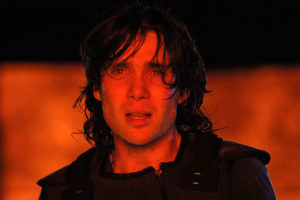 Another vital piece of preparation for Murphy was hanging out with the film’s scientific adviser, Dr Brian Cox. Though employed at the Centre for European Nuclear Research, the world’s largest particle-physics laboratory, his varied CV includes a stint as D:Ream’s keyboardist. He doesn’t sound like your typical egghead.
Another vital piece of preparation for Murphy was hanging out with the film’s scientific adviser, Dr Brian Cox. Though employed at the Centre for European Nuclear Research, the world’s largest particle-physics laboratory, his varied CV includes a stint as D:Ream’s keyboardist. He doesn’t sound like your typical egghead.